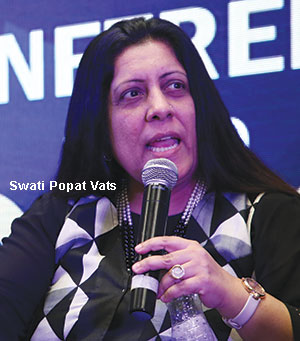 At the recent g20 summit held in Buenos Aires (Argentina), heads of the world’s leading economic powers including the United States, China and India gave their unequivocal support and commitment to prioritising early childhood development. There’s increasing awareness worldwide that early childhood education is critical for children to derive the full benefit of school and higher education. According to James J. Heckman, professor of economics at the University of Chicago and economics Nobel laureate (2000), every dollar invested in early years education gives a higher return than dollars invested in higher education.
At the recent g20 summit held in Buenos Aires (Argentina), heads of the world’s leading economic powers including the United States, China and India gave their unequivocal support and commitment to prioritising early childhood development. There’s increasing awareness worldwide that early childhood education is critical for children to derive the full benefit of school and higher education. According to James J. Heckman, professor of economics at the University of Chicago and economics Nobel laureate (2000), every dollar invested in early years education gives a higher return than dollars invested in higher education.
India runs the world’s largest public ECCE (early childhood care and education) programme under the Central government’s Integrated Child Development Services (ICDS) initiative. Introduced by the late prime minister Indira Gandhi in 1976, the ICDS programme manages 1.4 million anganwadis with an aggregate enrolment of 84 million children, i.e, 51 percent of India’s 164 million children in the 0-5 years age group.
However, the country’s million-plus anganwadis are essentially early childhood health and nutrition centres, and ill-equipped to provide early childhood education — a mandate imposed upon them in the new millennium without proper planning and investment. The 2.5 million anganwadi sevikas i.e, workers, are poorly qualified and trained, and too burdened with administrative duties to provide more than nominal early years education.
Moreover though on paper a well-designed ECCE curriculum draft exists, anganwadis are ill-equipped to implement it due to lack of budget, resources and training. In the Union Budget 2018-19, the Central government allocated Rs.16,334.88 crore for the ICDS programme — a mere Rs.1,944 per child per year — a sum clearly inadequate to provide nutrition, let alone professionally administered ECCE.
It’s tragic that despite an overwhelming body of research highlighting that investment in early years education yields far greater economic dividends than money invested in school and higher education, successive governments at the Centre and states have failed to invest in early childhood education, viewing it as a welfare initiative rather than economic imperative. Most countries worldwide have mandated ECCE for 15 hours per week for at least one year for all children in the 3-5 age group. Compulsory ECCE will prepare all children — particularly children of under-privileged households — to derive the full benefit of school and higher education.
Gaps in knowledge and ability between socially disadvantaged children and their more advantaged peers open up long before class I and persist throughout life, and are difficult and costly to close. Every year, we lament the findings of the Annual Status of Education Report which highlight abysmal student learning outcomes in primary schools in rural India. The root cause of the dismal ASER surveys is that children living in underprivileged households of rural India are almost totally deprived of early years education.
Unfortunately given the reality that the country’s 1.4 million anganwadis provide rudimentary ECCE, the vast quality differences in the early years experiences of a child in the ICDS programme and her counterpart in a private preschool make it highly unlikely that the two will ever perform equivalently in school, higher education and later in the job market.
I strongly believe viable public-private partnerships (PPPs) can revive India’s anganwadis. There are many areas where private preschools can contribute. Prime among them are teacher training, curriculum development and institutional management. To motivate and encourage private preschool managements to strike meaningful partnerships with anganwadis, the government needs to provide tax incentives to private preschool promoters.
And rather than have inspection by government inspectors, all PPPs can be monitored by the Early Childhood Association of India (ECA). Currently in a large number of anganwadis, early childhood education is being provided by NGOs not necessarily equipped or trained to offer ECCE. ECA will be happy to monitor and enable NGO-run anganwadis to ensure that minimum ECCE standards are maintained. It’s time for the slogan Sab bachcho ka bhala… desh ka vikas (children’s welfare ensures national success) to become common currency.
For those who may wonder why private sector educators and middle class parents should worry or care about the quality of early childhood education being delivered in government-run anganwadis, I conclude with a quote from Lilian Katz, the highly-respected professor emerita of early childhood education at the University of Illinois at Urbana-Champaign: “I believe that each of us must come to care about everyone else’s children. We must begin to see that the well-being of our own individual children is intimately linked to the well-being of other people’s children. After all, when one of our children needs life saving surgery, someone else’s child will perform it, when one of our children is threatened or harmed by violence in the streets, someone else’s child will inflict it. The good life for our own children can be secured if it is also secured for all other people’s children.”
(Dr. Swati Popat Vats is founder-president of the Early Childhood Association and president of the Podar Education Network)
Also read: 50 Leaders who can revive Indian education – Swati Popat Vats


























